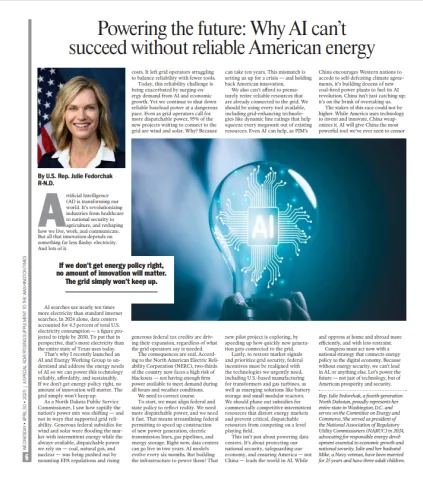Powering the future: Why AI can’t succeed without reliable American energy
Fedorchak pens op-ed in Washington Times
In a new op-ed, Congresswoman Julie Fedorchak (R-ND) outlines how securing reliable, affordable energy is critical to powering America’s leadership in Artificial Intelligence (AI). Fedorchak warns that surging energy demands from AI and an increasingly unreliable grid are threatening economic growth, innovation, and American security. She calls for a national strategy to align energy policy with the needs of the digital age, restore grid reliability, and keep America—not China—at the forefront of winning the future.
Read her op-ed below or click here to read it directly in The Washington Times.

Artificial Intelligence (AI) is transforming our world. It’s revolutionizing industries from healthcare to national security to agriculture, and reshaping how we live, work, and communicate. But all that innovation depends on something far less flashy: electricity. And lots of it.
AI searches use nearly ten times more electricity than standard internet searches. In 2024 alone, data centers accounted for 4.3 percent of total U.S. electricity consumption—a figure projected to triple by 2030. To put that in perspective, that’s more electricity than the entire state of Texas uses today.
That’s why I recently launched an AI and Energy Working Group to understand and address the energy needs of AI so we can power this technology reliably, affordably, and sustainably. If we don’t get energy policy right, no amount of innovation will matter. The grid simply won’t keep up.
As a North Dakota Public Service Commissioner, I saw how rapidly the nation’s power mix was shifting—and not in ways that supported grid reliability. Generous federal subsidies for wind and solar were flooding the market with intermittent energy while the always-available, dispatchable power we rely on—coal, natural gas, and nuclear—was being pushed out by mounting EPA regulations and rising costs. It left grid operators struggling to balance reliability with fewer tools.
Today, this reliability challenge is being exacerbated by surging energy demand from AI and economic growth. Yet we continue to shut down reliable baseload power at a dangerous pace. Even as grid operators call for more dispatchable power, 95 percent of the new projects waiting to connect to the grid are wind and solar. Why? Because generous federal tax credits are driving their expansion, regardless of what the grid operators say is needed.
The consequences are real. According to the North American Electric Reliability Corporation (NERC), two-thirds of the country now faces a high risk of blackouts—not having enough firm power available to meet demand during all hours and weather conditions.
We need to correct course.
To start, we must align federal and state policy to reflect reality. We need more dispatchable power, and we need it fast. That means streamlining federal permitting to speed up construction of new power generation, electric transmission lines, gas pipelines, and energy storage. Right now, data centers can go live in two years. AI models evolve every six months. But building the infrastructure to power them? That can take ten years. This mismatch is setting us up for a crisis—and holding back American innovation.
We also can’t afford to prematurely retire reliable resources that are already connected to the grid. We should be using every tool available, including grid-enhancing technologies like dynamic line ratings that help squeeze every megawatt out of existing resources. Even AI can help, as PJM’s new pilot project is exploring, by speeding up how quickly new generation gets connected to the grid.
Lastly, to restore market signals and prioritize grid security, federal incentives must be realigned with the technologies we urgently need including U.S.-based manufacturing for transformers and gas turbines, as well as emerging solutions like battery storage and small modular reactors. We should phase out subsidies for commercially competitive intermittent resources that distort energy markets and prevent critical, dispatchable resources from competing on a level playing field.
This isn’t just about powering data centers. It’s about protecting our national security, safeguarding our economy, and ensuring America—not China—leads the world in AI. While China encourages Western nations to accede to self-defeating climate agreements, it’s building dozens of new coal-fired power plants to fuel its AI revolution. China isn’t just catching up; it’s on the brink of overtaking us.
The stakes of this race could not be higher. While America uses technology to invent and innovate, China weaponizes it. AI will give China the most powerful tool we’ve ever seen to censor and oppress at home and abroad more efficiently, and with less restraint.
Congress must act now with a national strategy that connects energy policy to the digital economy. Because without energy security, we can’t lead in AI, or anything else. Let’s power the future—not just of technology, but of American prosperity and security.
CLICK HERE to learn more about Rep. Fedorchak’s AI and Energy Working Group.
CLICK HERE for a summary of Rep. Fedorchak’s questioning to Energy and Commerce Committee witnesses on American AI leadership.